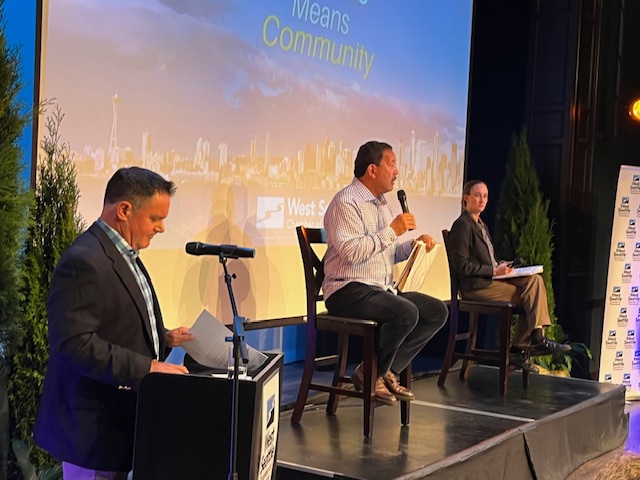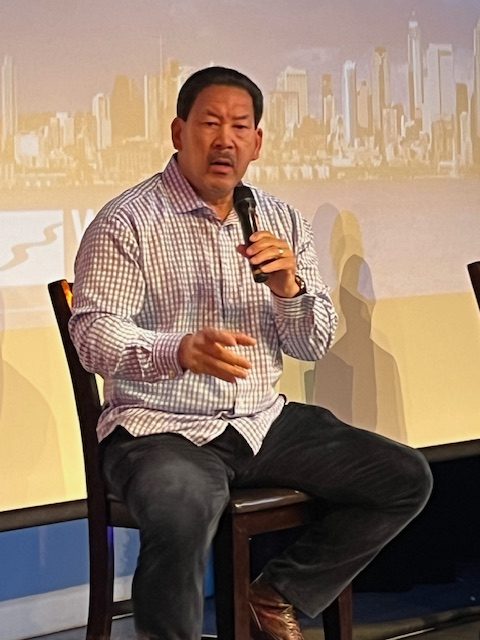 (WSB video and photos by Anne Higuera)
(WSB video and photos by Anne Higuera)
With less than a week until King County Elections sends out general-election ballots, the candidates in the most closely watched race, Seattle Mayor, appeared side by side at the West Seattle Chamber of Commerce‘s monthly lunch on Thursday. Below is our recording of the forum in its entirety; after it, toplines of what the candidates said.
Incumbent Bruce Harrell and challenger Katie Wilson answered questions from moderator Brian Callanan for almost an hour, after a brief introduction by West Seattle Chamber executive director Rachel Porter. Wilson founded and heads a nonprofit advocacy organization, the Transit Riders Union. Harrell was elected as mayor four years ago, two years after leaving the City Council, on which he’d been for more than a decade.
Moderator Callanan explained that the candidates had been provided the questions in advance, adding that they were developed by the Chamber’s board and advocacy-committee members. He also wanted to make it clear that he was serving as moderator in his Chamber role as a member representing his volunteer work organizing the Loop the ‘Lupe event every year, NOT in his role as a Seattle Channel host.
The candidates were each given two minutes to introduce themselves before the questions began. Below are toplines – watch the video to get the candidates’ full responses; everything below is a paraphrase unless it’s within quotation marks:
WILSON INTRO: “I’m running for mayor because I love this city.” She has spent 14 years as a “coalition-builder.” Homelessness, public safety, affordability are the major problems she feels the city’s facing.
HARRELL INTRO: “I entered public service on a very simple basis – to solve problems.” He says the city has invested in affordable housing and homelessness strategies, and says Seattle Police are “rebuilding.”
Question: What policies will you use to support small businesses, particularly those led by women, BIPOC, and other at-risk groups?
HARRELL: Mentions several city programs providing support, including capital access and storefront-repair fund.
WILSON: Has been talking to many small businesses and knows “the struggle is real.” Says small-business struggle is connected to housing affordability, especially so employees don’t have to live far away. Will work with BIAs and Chambers on safety issues.
Question: New or expanded tax measures on the ballot – residents and businesses affected – how will you ensure city lives within its current revenues before imposing new taxes?
WILSON: Hamstrung by state’s regressive tax system; she worked to pass Jump Start payroll tax “that has enabled mayor to balance the budget.” Need to take a hard look at everything the city spends on. Have not spent effectively on hotel-based shelter beds, Pro Publica investigation found.
HARRELL: Pro Publica article indicated we were “winding down the problem.” Otherwise, “we want to look at where we are wasting money.” Has to ask department heads about how they’re spending money. Working on multi-department permit process’s efficiency. “I know systems thinking.”
Question: West Seattle has a homelessness problem but lack of shelter and services. What is your plan for a city-owned/supported shelter in West Seattle, or helping nonprofits access the support needed to provide services?
HARRELL: Did not initially provide WS-specific answer. Homelessness has risen around the country and state, not just the city. “I resent that I’m getting blamed” for the problem. Seattle is bearing the brunt of it, though, but we can’t shoulder it ourselves. Will continue pushing for regional solution, but if it doesn’t work, we’ll do it ourselves. (On rebuttal, he says King County Regional Homelessness Authority put out a call for proposals but did not get any from West Seattle.)
WILSON: What we’re doing right now is not working. Yes, it’s rising everywhere. But Seattle is “national outlier.” We’ve lost shelter capacity every year Harrell’s been mayor. Will be her #1 priority to expand shelter around the city. Current policy is just to move people around. Regarding WS, she was talking to shelter operator Keith Hughes and shocked that he is operating the only shelter, she’ll “work with you all to make sure we can open up more enhanced shelter in West Seattle because we absolutely need that.”
Question: Lack of access to affordable housing, drug treatment, etc. How will you strengthen regional partnerships to address that?
WILSON: ‘Housing First’ is very successful when done right but we’re not necessarily doing it right. “City has a very important convening role to play” to “create realistic pathways” for people experiencing homelessness. Currently have “a system of dead ends.”
HARRELL: “The issue is the intersectionality between public-health crisis (with drugs) and a public-safety crisis.” He doesn’t control public health but does control public safety. “We will arrest criminals doing criminal conduct.” But nowhere to take people for treatment – crisis care centers will help, “we’re building those systems as we speak.”
Question: It’s been recently reported that SPD might be undermining the CARE department’s ability to provide 911 alternative response. How will you improve relationship between the two departments?
HARRELL: Both report to his public-safety chief Natalie Walton-Anderson, and “they get along well.” They get together and sometimes disagree. SPD has done part of the CARE job for decades … so hard time letting it go. But we’ve worked it out, and we’re doubling the CARE Department in the budget.
WILSON: Read the Seattle Times article about this; it’s disturbing. Commitment to alternative response made during 2020 protests. I support that. Disturbing to learn CARE Team has not been allowed to exercise full role. Why did this come out as newspaper exposé instead of being disclosed other ways?
HARRELL: It’s no scandal when the people I hire disagree. Crime is down.
WILSON: I’ve heard this has been a problem a long time.
Question: National Guard troops activated by Trump Administration in other cities. How would you respond?
WILSON: Need to show we are all united, regional, local, state governments, other institutions, “when we become united, we’re a less attractive target.” Need to fight in court, be smart, be prepared. Mayor’s surveillance expansion bothered me because data is not secure. Also disturbed to hear SPD answering ICE requests faster than journalists’ requests.
HARRELL: “We are leading the way with our fight.” Touts two executive orders issued yesterday, including prohibiting masks for ICE, not allowing staging on city properties. “We are loud” and making sure protesters know what to do. Says other regional leaders like governor and Portland mayor looking to him for leadership.
Question: Light rail coming to West Seattle could displace up to 70 small businesses. What financial and technical assistance will city provide to help them survive?
HARRELL: Going to do here what we did in Rainier Valley. “At the end of the day, we have to give you resources” – mentions some of the programs he noted earlier in response to a different issue. But, he also notes, it’ll be a fight to keep the West Seattle light rail project “because some people don’t want it,” but he thinks WS and Ballard are going to be good investments ‘for your children and your grandchildren.”
WILSON: Glad that Legislature allowed higher cap on assistance. “Some interesting tradeoffs” regarding building quickly, “rip the band-aid off” vs. “slow death,” need to discuss “to make sure we’re getting the best outcome.”
Question: Transportation Levy got voter approval, traffic’s still a concern, what does success look like at end of levy?
WILSON: Projects delivered on time and on budget, “and we don’t have a great track record with that.” G Line was problem-plagued. Communication with those affected by projects needs to improve.
HARRELL: I know what failure looks like – the inconveniences of the West Seattle Bridge closure – going to circulate a letter about related labor disputes and make sure “that doesn’t happen again.” He tries to “calm down” the transportation discussions, like cars vs. bikes. “What success looks like is” $1.5 billion spent with Vision Zero goals achieved.
Question: Given contentious national political landscape, how will you ensure Seattleites feel supported and involved in decisionmaking process?
HARRELL: I’m a Seattle person and very approachable. Have worked for your trust. “We are living in the craziest times … radioactivity in politics … I’m not perfect … If I make a mistake I’ll (own up to it).’ Says he gives himself permission to make five mistakes a day.
WILSON: This is personal to me – “I started the work I do back in 2011 because King County Metro” was going to make big cuts, and “bus riders were not feeling heard.” She has worked “to build that collective power.” Wants to govern in a way that empowers people. Hard to get buy-in if decisions are made top-down.
A lightning round ensued, with responses limited to :30, and questions admittedly more “light-hearted.”
Question: Where would you rather spend a Sunday afternoon, Pike Place Market or Alki Beach?
WILSON: Alki because “as a transit person” she loves riding the Water Taxi.
HARRELL: Alki – “it’s a gem” – because that’s where he learned to scuba-dive.
Question: If Seattle had official mascot, what would it be?
HARRELL: Some kind of a Husky-like … with a Mariner player to it.”
WILSON: Sockeye salmon.
Question: What is your go-to coffee order to survive the workday?
WILSON: “I’m really boring … normal tall latte.” Mentions that dates to when she was breastfeeding her daughter (now 2) and had to drink a lot of milk.
HARRELL: “I’m a simple coffee person … just a drip with cream and sugar. That’s a boring drink and I’m going to stick with it.”
Question: Which Seattle event is your can’t-miss event every year?
HARRELL: (Took a while to think of this) Opening game of the Huskies.
WILSON: “Not really an event but …” fall colors at Japanese Garden in Arboretum.
Question: If you could name a new ferry, what would you call it?
WILSON: (Admitted she was stumped, offered mayor the first turn, got more time but couldn’t think of one till someone in audience suggested recycling “Sockeye Salmon” from the “mascot” question.)
HARRELL: (Admitted he was stumped, finally suggested he’d name it in honor of former mayor Charles Royer.)
Closing statements followed.
WILSON: “I’m an outsider with an insider’s perspective. … I’ve seen how this city works and too often how it fails to work for the people of this city.” The mayor’s job is about assembling a competent team and she has experience doing that. Touts endorsements by labor and political groups, and that she received 51 percent of the vote in the primary.
HARRELL: “As your mayor I’ve tried to lead this city with … honesty, integrity, kindness, and strength.” … “There’s a lot of work still to do.” Says Wilson recently said she didn’t intend to run for public office, and he thinks her “lack of preparedness … shows.” During these times, he contends, “experience matters.” Touts endorsements by other elected officials.
REBUTTAL: After Harrell concluded, Wilson rebutted his allegations that she’s never hired an employee and never balanced a budget as “simply not true.” He countered that Pro Publica has listed the Transit Riders Union as having “zero” employees.
WHAT’S NEXT: King County sends out ballots next Wednesday, October 15. Dropboxes open the next day, October 16. You’ll have until 8 pm November 4 to return your ballot. It’ll include four ballot measures and 14 city, county, school, and state races.



| 41 COMMENTS